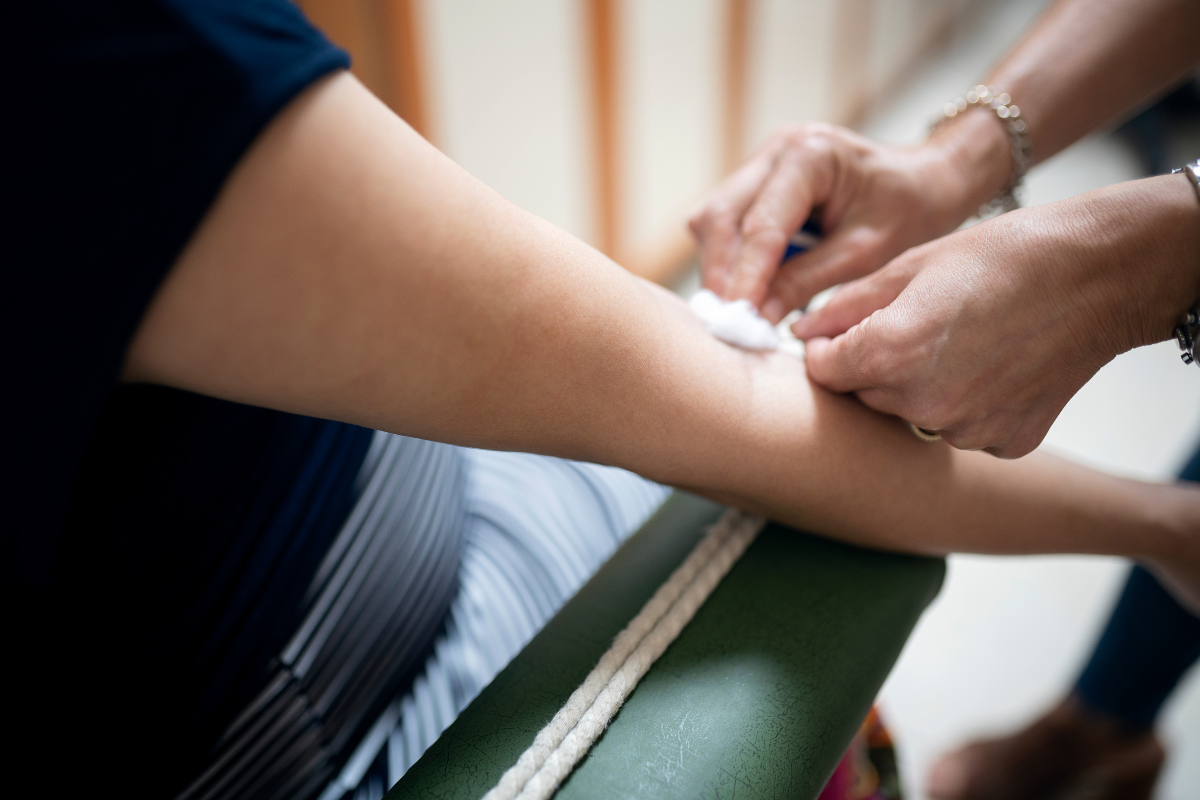
Here at the Marion Gluck Clinic, we place a focus on giving you the very best experience and precise, personalised care. We are often asked questions about the blood tests that are required for treatment at the clinic. We sat down with Dr Ghazala Aziz-Scott, one of our hormone doctors, to help answer your most frequently asked questions about blood tests for hormone levels and hormone balancing therapy.
Why Are Blood Tests So Important For Hormone Treatment?
Dr Aziz-Scott: Although we can get an idea of where the problem lies by assessing history and symptoms specific to hormone health, blood tests give us more information about exactly what’s going on with each patient we see.
At a glance, blood tests:
- Give an in-depth analysis of specific hormones.
- Ensure an accurate diagnosis.
- Allow your doctor to ensure the amount of hormones in your body are not higher than what is physiologically appropriate, and to know that the prescribed treatment is working effectively.
- Help your doctor understand if any changes to your medication are required.
- Are essential for monitoring your safety.
- Ensure you are getting the very best care from the Marion Gluck Clinic.
In the initial appointment, we need to understand whether a patient is perimenopausal, menopausal, or whether they could have premature menopause or some other hormonal condition. The initial blood tests allow us to evaluate which hormone levels are raised or lower than expected to aid with an accurate diagnosis.
If the follicle stimulating hormone (FSH) and luteinizing hormones (LH) are raised, this indicates perimenopause or menopause. If they are not raised, then this signifies that there is another kind of hormonal imbalance at play. We also look at the baseline levels of the sex hormones: estrogen, progesterone, testosterone and DHEA. Once we establish baseline blood results, it enables doctors to understand the exact situation and correlate the blood results with symptoms, and this then facilitates selection of the best treatment option for you.
Estrogen and progesterone
For women who are menstruating monthly, we check the blood hormone levels on day 21 of their cycle and analyse the estrogen-to-progesterone ratio, which should ideally be 10:1. Day 21 progesterone ( in a 28 day cycle) is indicative of whether a woman is ovulating. If your progesterone is low and estrogen is relatively high, then it is likely to cause symptoms of estrogen dominance, which is common in perimenopause and in women who present with PMDD or PMS.
The pattern of hormone change varies from woman to woman, and in perimenopause, estrogen levels can spike and fluctuate. Additionally, estrogen dominance is common, as is low progesterone due to irregular ovulation or anovulatory cycles. This is important to consider as perimenopausal patients may initially only need progesterone as part of their BHRT for symptom relief.
Testosterone
In menopause, both estrogen and progesterone are low (postmenopausal range), so we supplement both. When looking at testosterone, this is usually the last hormone to deplete. However, in some women, testosterone can decline before estrogen, and this can occur because there is decreased production of testosterone from the adrenal glands or some women convert their testosterone to estrogen in a process called aromatisation.This can be due to lifestyle factors and individual genetics.
We need to measure free testosterone because this tells us how much testosterone is bioavailable (available for the body to use). If we can’t measure free testosterone, we measure total testosterone and sex hormone binding globulin (SHBG) and calculate the free androgen index (FAI) as an indication of how much active testosterone is present.
Dehydroepiandrosterone (DHEA)
DHEA is an adrenal hormone. It is a precursor to the sex hormones and gradually declines with age. Some women have a low DHEA if they have had chronic stress or trauma, and supplementing DHEA is very beneficial for general health and wellbeing. However, this is not approached in conventional HRT treatment. Sometimes, giving a patient a small dose of everything is better for optimal hormone balance than just estrogen and progesterone.
We conduct follow-up blood tests to monitor the efficacy of the treatment and to ensure that our patients have optimal hormone levels in line with symptom improvement. For example, the patient may be feeling fine, but still require a higher amount of estrogen for adequate protection from osteoporosis.
Conversely, if the follow-up blood tests reveal that estrogen levels are too high, we may suspect that there is an issue with how the hormone is being metabolised in the body and that there is an issue with estrogen clearance. Blood levels are also indicative of adequate absorption of the BHRT – some patients don’t always absorb the transdermal creams very well, so we can try alternatives such as lozenges or oral micronised progesterone. In addition, we can adjust the dose of BHRT if needed when we correlate the blood tests with symptoms to ensure that our patients are getting the best results.
When you first begin your Marion Gluck Clinic journey, we may conduct blood tests fairly regularly. But once hormone levels are stabilised, we move to annual testing.
Do All Patients Need Blood Tests For Hormone Levels?
Dr Aziz-Scott: Although treatment is bespoke to you, patients will follow a similar patient journey, and in the initial consultation, blood tests for hormone levels are required for all patients. In some cases, women may come to the clinic with blood tests conducted externally by their GP, or another healthcare professional.
We do see patients that have had a Dried Urine Test for Comprehensive Hormones (DUTCH). The DUTCH test is a urinary assessment of hormones and can provide a great deal of useful information about the different hormone systems in the body. It is very useful in assessing how estrogen is metabolised and this is a very important factor to consider once you are on BHRT as certain estrogen metabolites can be toxic and increase breast cancer risk.
Depending on a patient’s individual situation, we may be able to work with DUTCH test results, but serum blood hormone levels are the gold standard of testing to provide an accurate baseline. Many clinics offer finger prick tests, but we opt for serum blood tests as these are less likely to provide erroneous results and unnecessary additional costs if repeats needed. Once we begin treatment, the monitoring process is also much more efficient with serum blood tests.
Your Marion Gluck Clinic doctor will advise you of the tests required during your consultation and will explain the options for how you can have blood drawn.
Is It Safe To Have Tests During The Pandemic?
Dr Aziz-Scott: It’s understandable that there is some hesitation about being around others at this time, but we would like to reassure you that your safety is of the utmost importance to us. It is safe to have your blood tests during the pandemic and as per Government advice, it is recommended that you keep any appointments or procedures you have booked.
What Is The Difference Between Treatment You Can Get With And Without Blood Test Results?
Dr Aziz-Scott: GPs follow the NICE guidelines which state that if a patient is over 45, blood tests are not mandatory and HRT can be initiated, depending on symptoms. It is only if a patient is under 45 that an FSH blood test is required. LH levels will also be checked, but estrogen will not be. This means that patients may be getting a one-size-fits-all treatment.
At the Marion Gluck Clinic, all patients are required to undergo blood tests to allow us to provide bespoke, personalised treatment tailored precisely to your body’s requirements.
You’ll note that:
- We will complete a detailed hormone analysis and provide the correct hormones in the appropriate dosages for your individual needs. We know that estrogen, progesterone, testosterone and DHEA all interact, and that a balance of hormones is essential for optimum health and controlled symptoms. It is therefore the gold standard to have all hormones analysed before treatment.
- The free testosterone that we can measure in the private sector is not usually available on the NHS. We can check total testosterone and SHBG to work out the free androgen index, which tells us how much testosterone is bioavailable in the body.
- We monitor our patients’ hormone levels and adjust treatment accordingly. We are always monitoring the treatment’s efficiency and efficacy.
Still Have Questions?
Discover more about blood tests for bioidentical hormone replacement therapy, and don’t hesitate to book a video or telephone consultation with one of our specialist hormone doctors to answer further questions or begin your BHRT journey.



